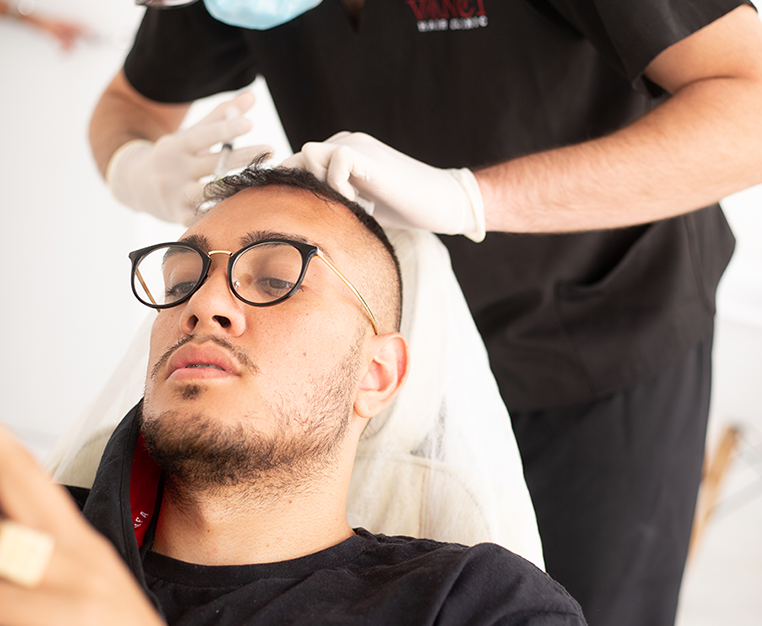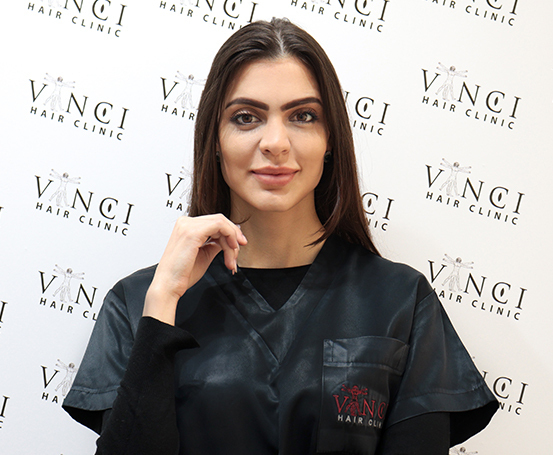Hair loss can be distressing – especially when it seems to come out of nowhere. One minute you’re styling your hair as usual, the next you’re noticing thinning at the crown, a widening part, or more strands in the shower drain. But before you jump to conclusions, it’s important to understand why hair loss happens.
At Vinci Hair Clinic, one of the most common questions we hear is:
“What’s causing my hair loss? Is it genetic, hormonal, or something I’m doing wrong?”
In this article, we break down the three most common causes of hair loss – genetics, hormones, and lifestyle – so you can better understand your condition and explore the right treatment options.
1. Genetic Hair Loss (Androgenetic Alopecia)
What is it?
Androgenetic alopecia, also known as male pattern baldness or female pattern hair loss, is the most common cause of hair loss worldwide. It’s inherited and typically progresses gradually over time.
Key signs:
- Receding hairline in men (often forming an M shape)
- Thinning at the crown or top of the head
- Widening part or diffuse thinning in women
- Family history of hair loss on either side
Why it happens:
Genetic hair loss is linked to DHT (dihydrotestosterone), a byproduct of testosterone that can shrink hair follicles in people who are genetically predisposed. Over time, follicles miniaturize and produce finer, shorter hairs until growth stops entirely.
What helps:
- Hair transplants (FUE)
- PRP therapy to stimulate follicles
- Minoxidil-based treatments like Maxogaine
- DHT-blocking shampoos and supplements
- Low-level laser therapy (LLLT)
2. Hormonal Hair Loss
What is it?
Hormonal imbalances can trigger sudden or gradual hair thinning, especially in women. Hormones impact the hair growth cycle, and any disruption can lead to excessive shedding or miniaturisation.
Key causes:
- Pregnancy and postpartum
- Menopause
- Polycystic Ovary Syndrome (PCOS)
- Thyroid imbalances (hypothyroidism or hyperthyroidism)
- Hormonal contraceptives or hormone replacement therapy
Key signs:
- Sudden, diffuse shedding (telogen effluvium)
- Thinning at the crown or temples
- Hair loss accompanied by acne, irregular periods, or weight changes
What helps:
- Blood tests to identify hormonal imbalances
- Mesotherapy or PRP to restore growth
- Laser cap therapy
- Medical treatments or nutritional support tailored to hormonal needs
- Topical Minoxidil (especially for postmenopausal women)
At Vinci Hair Clinic, we work with clients to assess potential hormonal triggers before beginning treatment – because effective solutions begin with an accurate diagnosis.
3. Lifestyle-Driven Hair Loss
What is it?
Your daily habits may be silently contributing to hair loss. From stress to diet to tight hairstyles, lifestyle factors can weaken hair follicles over time.
Key lifestyle triggers:
- High stress or anxiety (linked to telogen effluvium)
- Poor nutrition (low iron, protein, or vitamin D)
- Crash dieting or eating disorders
- Overstyling and heat damage
- Tight ponytails, braids, or hair extensions (traction alopecia)
- Lack of sleep or exercise
What helps:
- Nutritional supplements (like Vinci’s Vitruvian Line)
- Relaxation techniques (yoga, breathwork, lifestyle coaching)
- Switching to gentle, non-damaging hairstyles
- Topical treatments and scalp serums
- Early intervention with therapies like PRP or mesotherapy
Lifestyle changes often work best when paired with professional guidance – which is where Vinci’s personalised consultations come in.
Why It Matters: Getting the Right Diagnosis
Many people assume all hair loss is the same – but the underlying cause determines the best treatment. Treating genetic hair loss with stress relief, for example, might not move the needle. And using topical Minoxidil for hormonal hair loss without correcting the imbalance could lead to underwhelming results.
At Vinci Hair Clinic, we take a holistic approach to hair restoration, starting with an in-depth scalp analysis, medical history review, and treatment planning tailored to your root cause.
Still Unsure? We Can Help
If you’re noticing thinning, shedding, or patchy regrowth, don’t wait for it to worsen. Hair loss is often easier to treat in the early stages – and with today’s advanced options, you don’t have to settle for less than full, healthy hair.



